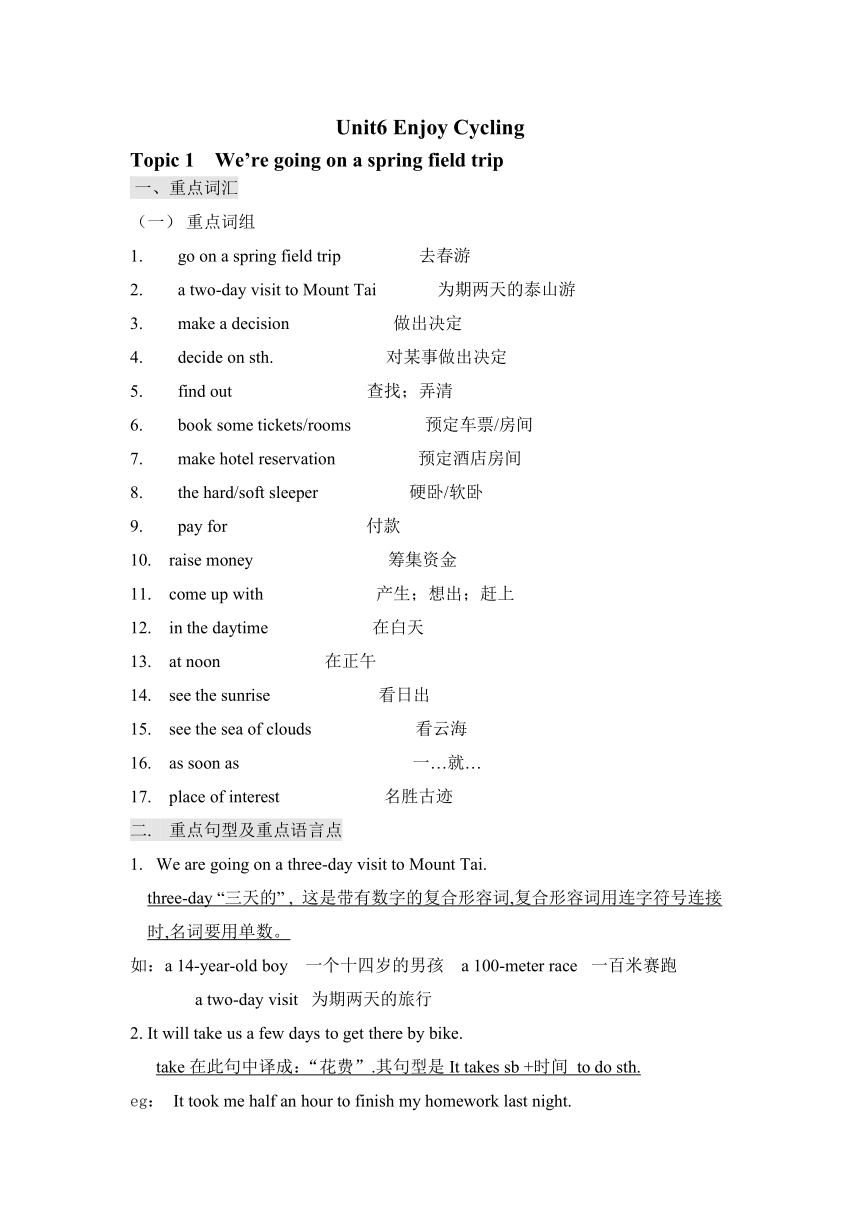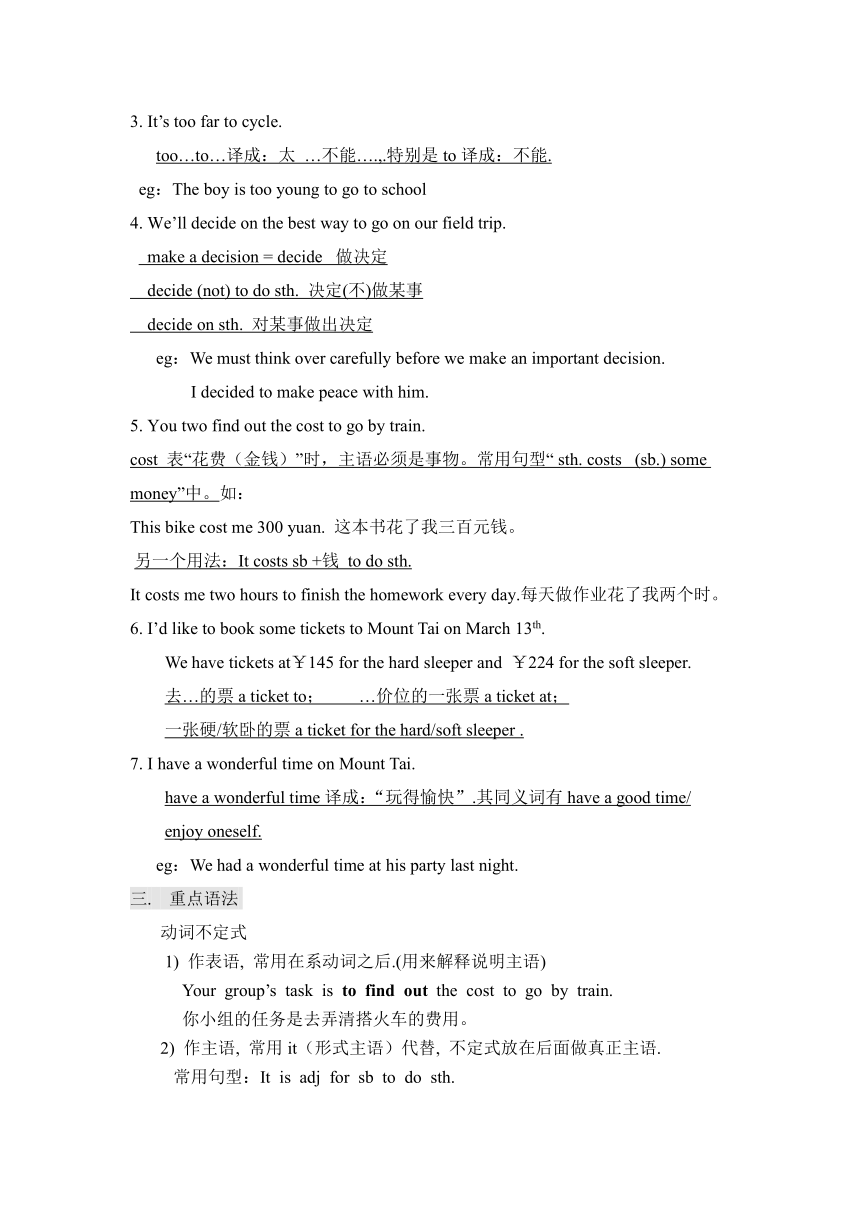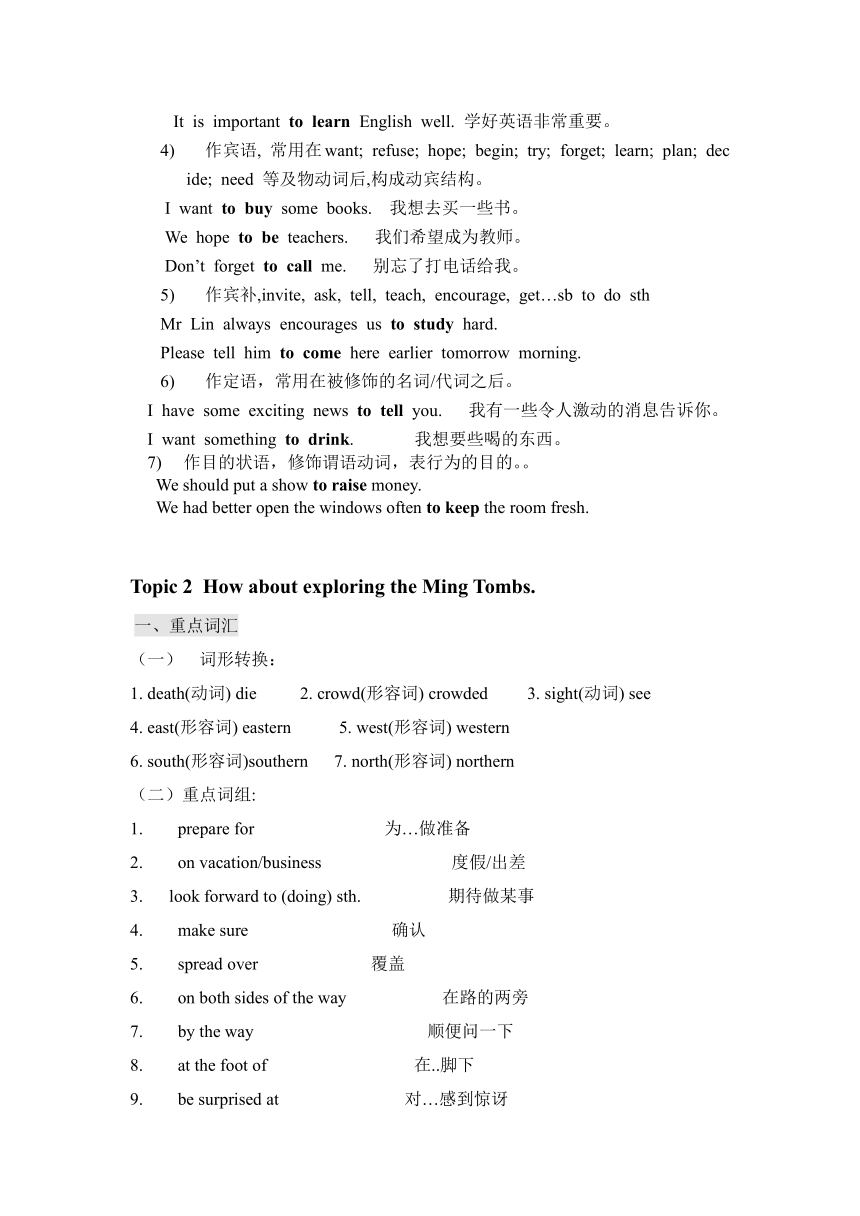Unit 6 Enjoying Cycling语言点归纳(重点词汇+句型+知识点)
文档属性
| 名称 | Unit 6 Enjoying Cycling语言点归纳(重点词汇+句型+知识点) |  | |
| 格式 | zip | ||
| 文件大小 | 83.5KB | ||
| 资源类型 | 试卷 | ||
| 版本资源 | 仁爱科普版 | ||
| 科目 | 英语 | ||
| 更新时间 | 2020-06-02 16:31:06 | ||
图片预览



文档简介
Unit6
Enjoy
Cycling
Topic
1??
We’re
going
on
a
spring
field
trip
?一、重点词汇
(一)?重点词组
1.??????
go
on
a
spring
field
trip????????????????
去春游
2.??????
a
two-day
visit
to
Mount
Tai????????????
为期两天的泰山游
3.??????
make
a
decision??????????????????????
做出决定
4.??????
decide
on
sth.????????????????????????
对某事做出决定
5.??????
find
out?????????????????????????????
查找;弄清
6.??????
book
some
tickets/rooms???????????????
预定车票/房间
7.??????
make
hotel
reservation?????????????????
预定酒店房间
8.??????
the
hard/soft
sleeper???????????????????
硬卧/软卧
9.??????
pay
for??????????????????????????????
付款
10.??
raise
money
?
筹集资金
11.??
come
up
with????????????????????????
产生;想出;赶上
12.??
in
the
daytime
在白天
13.??
at
noon
??????????????????在正午
14.??
see
the
sunrise???????????????????????
看日出
15.??
see
the
sea
of
clouds??????????????????????
看云海
16.??
as
soon
as
一…就…
17.??
place
of
interest
名胜古迹
二.??
重点句型及重点语言点
1.?
We
are
going
on
a
three-day
visit
to
Mount
Tai.
??
three-day
“三天的”
,
这是带有数字的复合形容词,复合形容词用连字符号连接时,名词要用单数。
如:a
14-year-old
boy??
一个十四岁的男孩??
a
100-meter
race?
一百米赛跑
?????????????
a
two-day
visit?
为期两天的旅行
2.
It
will
take
us
a
few
days
to
get
there
by
bike.
take在此句中译成:“花费”.其句型是It
takes
sb
+时间
to
do
sth.
eg:
It
took
me
half
an
hour
to
finish
my
homework
last
night.
3.
It’s
too
far
to
cycle.
too…to…译成:太
…不能….,.特别是to译成:不能.
eg:The
boy
is
too
young
to
go
to
school
4.
We’ll
decide
on
the
best
way
to
go
on
our
field
trip.
make
a
decision
=
decide?
做决定
??
decide
(not)
to
do
sth.
决定(不)做某事
??
decide
on
sth.
对某事做出决定
eg:We
must
think
over
carefully
before
we
make
an
important
decision.
I
decided
to
make
peace
with
him.
5.
You
two
find
out
the
cost
to
go
by
train.
cost
表“花费(金钱)”时,主语必须是事物。常用句型“
sth.
costs?
(sb.)
some
money”中。如:
This
bike
cost
me
300
yuan.
这本书花了我三百元钱。
?另一个用法:It
costs
sb
+钱
to
do
sth.
It
costs
me
two
hours
to
finish
the
homework
every
day.每天做作业花了我两个时。
6.
I’d
like
to
book
some
tickets
to
Mount
Tai
on
March
13th.
We
have
tickets
at¥145
for
the
hard
sleeper
and
¥224
for
the
soft
sleeper.
去…的票a
ticket
to;
…价位的一张票a
ticket
at;
一张硬/软卧的票a
ticket
for
the
hard/soft
sleeper?.
7.
I
have
a
wonderful
time
on
Mount
Tai.
have
a
wonderful
time译成:“玩得愉快”.其同义词有have
a
good
time/
enjoy
oneself.
eg:We
had
a
wonderful
time
at
his
party
last
night.
三.??
重点语法?
动词不定式
1)
作表语,
常用在系动词之后.(用来解释说明主语)
Your
group’s
task
is
to
find
out
the
cost
to
go
by
train.
你小组的任务是去弄清搭火车的费用。
2)
作主语,
常用it(形式主语)代替,
不定式放在后面做真正主语.
常用句型:It
is
adj
for
sb
to
do
sth.
It
is
important
to
learn
English
well.
学好英语非常重要。
4)?????
作宾语,
常用在want;
refuse;
hope;
begin;
try;
forget;
learn;
plan;
decide;
need
等及物动词后,构成动宾结构。
I
want
to
buy
some
books.
我想去买一些书。
We
hope
to
be
teachers.
我们希望成为教师。
Don’t
forget
to
call
me.
别忘了打电话给我。
5)?????
作宾补,invite,
ask,
tell,
teach,
encourage,
get…sb
to
do
sth
Mr
Lin
always
encourages
us
to
study
hard.
Please
tell
him
to
come
here
earlier
tomorrow
morning.
6)?????
作定语,常用在被修饰的名词/代词之后。
I
have
some
exciting
news
to
tell
you.
我有一些令人激动的消息告诉你。
I
want
something
to
drink.
我想要些喝的东西。
7)?????作目的状语,修饰谓语动词,表行为的目的。。
We
should
put
a
show
to
raise
money.
We
had
better
open
the
windows
often
to
keep
the
room
fresh.
Topic
2??How
about
exploring
the
Ming
Tombs.
?一、重点词汇
(一)??
词形转换:??
1.
death(动词)
die??????????2.
crowd(形容词)
crowded
???
3.
sight(动词)
see????
4.
east(形容词)
eastern???????
5.
west(形容词)
western
6.
south(形容词)southern????
7.
north(形容词)
northern????
(二)重点词组:
1.??????
prepare
for?????????????????????????
?为…做准备
2.??????
on
vacation/business??????????
??????????????????度假/出差
3.??????look
forward
to
(doing)
sth.??????????????????
期待做某事
4.??????
make
sure???????????????????????????????
确认
5.??????
spread
over????????????????????????
覆盖
6.??????
on
both
sides
of
the
way????????????????????
在路的两旁
7.??????
by
the
way
顺便问一下
8.
at
the
foot
of
在..脚下
9.??????
be
surprised
at???????????????????????????
对…感到惊讶
10.??????
be
crowded
with??????????????????????????
挤满了…
11.??
be
full
of????????????????????????
挤满了…
12.??
two
and
a
half
hours????????
???????????????两个半小时
13.??
take
out
sth.?????????????????????????????
拿出某物
13.??out
of
sight?????????????????????????????
看不见
14.??
in
all
directions
四面八方
15.??
stand
for
代表
16.??
get
off
下来
17.??
shout
at
对…叫
18.??be/get
lost
迷路
19.??
ask
for
help
向…求助
20.??
have
fun
doing
sth.??????????????????????
做某事有乐趣
二、重点句型及重点语言点
1.
I
am
looking
forward
to
meeting
him.
look
forward
to
表
“期待,
盼望”,
to是介词,后面应用名词、代词或动名词,且常用于进行时态。如:
I’m
really
look
forward
to
summer
vacation.
I
am
looking
forward
to
learning
English
from
you.
类似用法的短语有pay
attention
to,
stick
to,
get
used
to
sth/doing
sth…
eg:Please
pay
attention
to
saving
every
drop
of
water.
2.???
Dinglig
is
to
the
southwest
of
Kangling.
方位介词:
in;
on;
to用法:in表在范围内;
on表两处相接壤;
to
表两处不相接壤
如:Fujian
is
in
the
southeast
of
China.
福建在中国的东南部.
Jiangxi
is
on
the
west
of
Fujian.
江西在福建的西面.
Japan
is
to
the
east
of
China.
日本在中国的东边.
3.
Kang,
Michael
and
Darren
arrived
at
the
Ming
tombs.
①arrived
at译成:“到达”;
arrived
at跟具体方位;arrived
in跟
广义的地点.
②
arrived
at/in的同义词是get
to
和reach.
eg:We
arrived
at/got
to/reached
the
People
Park
by
bike
yesterday.
4.
The
crowd
of
people
became
larger
and
larger.
larger
and
larger译成:越来越大
;
由此推断单音节或部分双音节形容词的“越来越…”英文表达结构是“adj比and
adj比”;
而多音节形容词的“越来越…”英文表达结构是“more
and
more
+adj原”.
eg:The
weather
is
getting
warmer
and
warmer
in
spring.
She
becomes
more
and
more
beautiful
now.
5.
While
we
were
having
fun
exploring,
I
realized
Darren
was
lost.
have
fun
doing
sth.
表做某事有乐趣.
如:You’ll
find
you
have
fun
learning
English.
三、重点语法?
(一)??
时间状语从句:
1.??????
引导词:
a)???????
when;
while;
as?
当……时候
when
既可跟短暂性动词也可跟延续性动词
while
跟延续性动词
as???
多用于口语,强调
“同一时间”或
“一前一后”
???????
e,g:?
The
students
were
talking
in
the
classroom
when
the
teacher
came
in.
=
While
the
students
were
talking
in
the
classroom,
the
teacher
came
in.
Mother
always
sings
as
she
cooks
dinner
for
us.
b)???????
until;?
not…until
??????????
until?
“直到……为止”,主句的谓语动词用延续性动词。
not…until?
“直到……才”
主句的谓语动词常用短暂性动词。
e.g:?
I
will
stay
here
until
the
rain
stops.
????
=
I
won’t
leave
here
until
the
rain
stops.
c)???????
after
在……之后;?
before在……之前;?
as
soon
as
一……就……
e.g:?
I
went
to
sleep
after
I
finished
my
homework..
????
=
I
finished
my
homework
before
I
went
to
sleep.
????
As
soon
as
the
bell
rings,
the
students
will
go
into
the
classroom.
2.??????
时态:
a)???????
当主句为一般过去时时,
从句常为过去的某种时态;
e.g:?
While
the
students
were
talking
in
the
classroom,
the
teacher
came
in.
????
I
went
to
sleep
after
I
finished
my
homework..
b)???????
当主句为一般将来时时,
从句为一般现在时
e.g:?
As
soon
as
the
bell
rings,
the
students
will
go
into
the
classroom.
????
I
will
stay
here
until
the
rain
stops.
?
Topic
3
Bicycles
are
popular.
一、重点词汇:
1.??????
get
used
to??????????????????????
习惯
2.??????
obey
traffic
rules????????????
遵守交通规则
3.??????
break
the
traffic
rules
违反交通规则
4.
save
energy???????????????
节省能源
5.??????
slow
down?????????????????????????
减速
6.??????avoid
doing
sth.?????????????????????
避免做某事
7.??????
get
a
fine??????????????????????????
得到处罚
8.
in
danger
在危险中
9.
warn
sb.
about
sth.???????????????????
提醒某人当心某事
10.?????warn
sb.to
do
sth.???????????????????提醒某做某事
11.
go
on
doing
继续做
二、重点句型及重点语言点
1.
To
avoid
hitting
the
truck,
the
young
man
ran
into
the
wall
and
hurt
his
arm
badly.
avoid
doing
sth.
避免做某事
eg:To
avoid
hurting
ourselves,
we
should
obey
the
traffic
rules.
2.
There
is
a
crossing
ahead,
It
warns
us
to
be
more
careful.
warn
sb.to
do
sth.???????????????????提醒某人某做某事
warn
sb.
on/about
sth.???????????????????提醒某人当心某事
如:I
want
to
tell
you
about
a
bike
accident
and
warn
you
about
the
crazy
traffic.
我想告诉你一个自行车事故,并提醒你当心混乱的交通。
My
parents
always
warn
me
to
finish
the
homework
before
going
to
bed.
我父母老师提醒我在睡觉前要完成作业。
3.Lance
Armstrong,
the
American
cyclist,
is
famous
for
his
achievement
and
courage
in
cycling.
be
famous
for与be
famous
as有区别,
be
famous
for
后跟作品,景点/as后跟身份,地位
eg:
Zhao
Benshan
is
famous
as
a
funny
actor.
Hang
zhou
is
famous
for
West
Lake.
4.
Later
that
year,
a
serious
disease
made
him
stop
riding.
sop
doing停下正在做的事情
stop
to
do停下来去做另一件事
eg:I
work
so
long
time,
I
must
stop
to
have
a
rest.
Please
stop
talking
loudly,
it
is
too
noisy.
5.
He
went
on
winning
the
Tour
France
from
2000
till
2004.
go
on
doing继续做同一件事
go
on
to
do继续做另一件事
eg:Go
on
to
do
the
other
exercise
after
you
finish
this
one.
做完这个练习题后,接着做另一个练习题。
After
a
short
break,
I
go
on
doing
my
homework.
在短暂的休息后,我继续做作业。
三、重点语法
?
条件状语从句:
由if
引导,表
“如果”
1.??????
时态:
主句是一般将来时态或具有将来的含义,
从句常用一般现在时.
If
you
break
the
traffic
rules,
you
will
get
a
fine.
If
it
rains
tomorrow,
we
won’t
hold
the
sports
meeting.
If
you
drive
a
car
in
Britain,
you
must
be
careful.
?
Enjoy
Cycling
Topic
1??
We’re
going
on
a
spring
field
trip
?一、重点词汇
(一)?重点词组
1.??????
go
on
a
spring
field
trip????????????????
去春游
2.??????
a
two-day
visit
to
Mount
Tai????????????
为期两天的泰山游
3.??????
make
a
decision??????????????????????
做出决定
4.??????
decide
on
sth.????????????????????????
对某事做出决定
5.??????
find
out?????????????????????????????
查找;弄清
6.??????
book
some
tickets/rooms???????????????
预定车票/房间
7.??????
make
hotel
reservation?????????????????
预定酒店房间
8.??????
the
hard/soft
sleeper???????????????????
硬卧/软卧
9.??????
pay
for??????????????????????????????
付款
10.??
raise
money
?
筹集资金
11.??
come
up
with????????????????????????
产生;想出;赶上
12.??
in
the
daytime
在白天
13.??
at
noon
??????????????????在正午
14.??
see
the
sunrise???????????????????????
看日出
15.??
see
the
sea
of
clouds??????????????????????
看云海
16.??
as
soon
as
一…就…
17.??
place
of
interest
名胜古迹
二.??
重点句型及重点语言点
1.?
We
are
going
on
a
three-day
visit
to
Mount
Tai.
??
three-day
“三天的”
,
这是带有数字的复合形容词,复合形容词用连字符号连接时,名词要用单数。
如:a
14-year-old
boy??
一个十四岁的男孩??
a
100-meter
race?
一百米赛跑
?????????????
a
two-day
visit?
为期两天的旅行
2.
It
will
take
us
a
few
days
to
get
there
by
bike.
take在此句中译成:“花费”.其句型是It
takes
sb
+时间
to
do
sth.
eg:
It
took
me
half
an
hour
to
finish
my
homework
last
night.
3.
It’s
too
far
to
cycle.
too…to…译成:太
…不能….,.特别是to译成:不能.
eg:The
boy
is
too
young
to
go
to
school
4.
We’ll
decide
on
the
best
way
to
go
on
our
field
trip.
make
a
decision
=
decide?
做决定
??
decide
(not)
to
do
sth.
决定(不)做某事
??
decide
on
sth.
对某事做出决定
eg:We
must
think
over
carefully
before
we
make
an
important
decision.
I
decided
to
make
peace
with
him.
5.
You
two
find
out
the
cost
to
go
by
train.
cost
表“花费(金钱)”时,主语必须是事物。常用句型“
sth.
costs?
(sb.)
some
money”中。如:
This
bike
cost
me
300
yuan.
这本书花了我三百元钱。
?另一个用法:It
costs
sb
+钱
to
do
sth.
It
costs
me
two
hours
to
finish
the
homework
every
day.每天做作业花了我两个时。
6.
I’d
like
to
book
some
tickets
to
Mount
Tai
on
March
13th.
We
have
tickets
at¥145
for
the
hard
sleeper
and
¥224
for
the
soft
sleeper.
去…的票a
ticket
to;
…价位的一张票a
ticket
at;
一张硬/软卧的票a
ticket
for
the
hard/soft
sleeper?.
7.
I
have
a
wonderful
time
on
Mount
Tai.
have
a
wonderful
time译成:“玩得愉快”.其同义词有have
a
good
time/
enjoy
oneself.
eg:We
had
a
wonderful
time
at
his
party
last
night.
三.??
重点语法?
动词不定式
1)
作表语,
常用在系动词之后.(用来解释说明主语)
Your
group’s
task
is
to
find
out
the
cost
to
go
by
train.
你小组的任务是去弄清搭火车的费用。
2)
作主语,
常用it(形式主语)代替,
不定式放在后面做真正主语.
常用句型:It
is
adj
for
sb
to
do
sth.
It
is
important
to
learn
English
well.
学好英语非常重要。
4)?????
作宾语,
常用在want;
refuse;
hope;
begin;
try;
forget;
learn;
plan;
decide;
need
等及物动词后,构成动宾结构。
I
want
to
buy
some
books.
我想去买一些书。
We
hope
to
be
teachers.
我们希望成为教师。
Don’t
forget
to
call
me.
别忘了打电话给我。
5)?????
作宾补,invite,
ask,
tell,
teach,
encourage,
get…sb
to
do
sth
Mr
Lin
always
encourages
us
to
study
hard.
Please
tell
him
to
come
here
earlier
tomorrow
morning.
6)?????
作定语,常用在被修饰的名词/代词之后。
I
have
some
exciting
news
to
tell
you.
我有一些令人激动的消息告诉你。
I
want
something
to
drink.
我想要些喝的东西。
7)?????作目的状语,修饰谓语动词,表行为的目的。。
We
should
put
a
show
to
raise
money.
We
had
better
open
the
windows
often
to
keep
the
room
fresh.
Topic
2??How
about
exploring
the
Ming
Tombs.
?一、重点词汇
(一)??
词形转换:??
1.
death(动词)
die??????????2.
crowd(形容词)
crowded
???
3.
sight(动词)
see????
4.
east(形容词)
eastern???????
5.
west(形容词)
western
6.
south(形容词)southern????
7.
north(形容词)
northern????
(二)重点词组:
1.??????
prepare
for?????????????????????????
?为…做准备
2.??????
on
vacation/business??????????
??????????????????度假/出差
3.??????look
forward
to
(doing)
sth.??????????????????
期待做某事
4.??????
make
sure???????????????????????????????
确认
5.??????
spread
over????????????????????????
覆盖
6.??????
on
both
sides
of
the
way????????????????????
在路的两旁
7.??????
by
the
way
顺便问一下
8.
at
the
foot
of
在..脚下
9.??????
be
surprised
at???????????????????????????
对…感到惊讶
10.??????
be
crowded
with??????????????????????????
挤满了…
11.??
be
full
of????????????????????????
挤满了…
12.??
two
and
a
half
hours????????
???????????????两个半小时
13.??
take
out
sth.?????????????????????????????
拿出某物
13.??out
of
sight?????????????????????????????
看不见
14.??
in
all
directions
四面八方
15.??
stand
for
代表
16.??
get
off
下来
17.??
shout
at
对…叫
18.??be/get
lost
迷路
19.??
ask
for
help
向…求助
20.??
have
fun
doing
sth.??????????????????????
做某事有乐趣
二、重点句型及重点语言点
1.
I
am
looking
forward
to
meeting
him.
look
forward
to
表
“期待,
盼望”,
to是介词,后面应用名词、代词或动名词,且常用于进行时态。如:
I’m
really
look
forward
to
summer
vacation.
I
am
looking
forward
to
learning
English
from
you.
类似用法的短语有pay
attention
to,
stick
to,
get
used
to
sth/doing
sth…
eg:Please
pay
attention
to
saving
every
drop
of
water.
2.???
Dinglig
is
to
the
southwest
of
Kangling.
方位介词:
in;
on;
to用法:in表在范围内;
on表两处相接壤;
to
表两处不相接壤
如:Fujian
is
in
the
southeast
of
China.
福建在中国的东南部.
Jiangxi
is
on
the
west
of
Fujian.
江西在福建的西面.
Japan
is
to
the
east
of
China.
日本在中国的东边.
3.
Kang,
Michael
and
Darren
arrived
at
the
Ming
tombs.
①arrived
at译成:“到达”;
arrived
at跟具体方位;arrived
in跟
广义的地点.
②
arrived
at/in的同义词是get
to
和reach.
eg:We
arrived
at/got
to/reached
the
People
Park
by
bike
yesterday.
4.
The
crowd
of
people
became
larger
and
larger.
larger
and
larger译成:越来越大
;
由此推断单音节或部分双音节形容词的“越来越…”英文表达结构是“adj比and
adj比”;
而多音节形容词的“越来越…”英文表达结构是“more
and
more
+adj原”.
eg:The
weather
is
getting
warmer
and
warmer
in
spring.
She
becomes
more
and
more
beautiful
now.
5.
While
we
were
having
fun
exploring,
I
realized
Darren
was
lost.
have
fun
doing
sth.
表做某事有乐趣.
如:You’ll
find
you
have
fun
learning
English.
三、重点语法?
(一)??
时间状语从句:
1.??????
引导词:
a)???????
when;
while;
as?
当……时候
when
既可跟短暂性动词也可跟延续性动词
while
跟延续性动词
as???
多用于口语,强调
“同一时间”或
“一前一后”
???????
e,g:?
The
students
were
talking
in
the
classroom
when
the
teacher
came
in.
=
While
the
students
were
talking
in
the
classroom,
the
teacher
came
in.
Mother
always
sings
as
she
cooks
dinner
for
us.
b)???????
until;?
not…until
??????????
until?
“直到……为止”,主句的谓语动词用延续性动词。
not…until?
“直到……才”
主句的谓语动词常用短暂性动词。
e.g:?
I
will
stay
here
until
the
rain
stops.
????
=
I
won’t
leave
here
until
the
rain
stops.
c)???????
after
在……之后;?
before在……之前;?
as
soon
as
一……就……
e.g:?
I
went
to
sleep
after
I
finished
my
homework..
????
=
I
finished
my
homework
before
I
went
to
sleep.
????
As
soon
as
the
bell
rings,
the
students
will
go
into
the
classroom.
2.??????
时态:
a)???????
当主句为一般过去时时,
从句常为过去的某种时态;
e.g:?
While
the
students
were
talking
in
the
classroom,
the
teacher
came
in.
????
I
went
to
sleep
after
I
finished
my
homework..
b)???????
当主句为一般将来时时,
从句为一般现在时
e.g:?
As
soon
as
the
bell
rings,
the
students
will
go
into
the
classroom.
????
I
will
stay
here
until
the
rain
stops.
?
Topic
3
Bicycles
are
popular.
一、重点词汇:
1.??????
get
used
to??????????????????????
习惯
2.??????
obey
traffic
rules????????????
遵守交通规则
3.??????
break
the
traffic
rules
违反交通规则
4.
save
energy???????????????
节省能源
5.??????
slow
down?????????????????????????
减速
6.??????avoid
doing
sth.?????????????????????
避免做某事
7.??????
get
a
fine??????????????????????????
得到处罚
8.
in
danger
在危险中
9.
warn
sb.
about
sth.???????????????????
提醒某人当心某事
10.?????warn
sb.to
do
sth.???????????????????提醒某做某事
11.
go
on
doing
继续做
二、重点句型及重点语言点
1.
To
avoid
hitting
the
truck,
the
young
man
ran
into
the
wall
and
hurt
his
arm
badly.
avoid
doing
sth.
避免做某事
eg:To
avoid
hurting
ourselves,
we
should
obey
the
traffic
rules.
2.
There
is
a
crossing
ahead,
It
warns
us
to
be
more
careful.
warn
sb.to
do
sth.???????????????????提醒某人某做某事
warn
sb.
on/about
sth.???????????????????提醒某人当心某事
如:I
want
to
tell
you
about
a
bike
accident
and
warn
you
about
the
crazy
traffic.
我想告诉你一个自行车事故,并提醒你当心混乱的交通。
My
parents
always
warn
me
to
finish
the
homework
before
going
to
bed.
我父母老师提醒我在睡觉前要完成作业。
3.Lance
Armstrong,
the
American
cyclist,
is
famous
for
his
achievement
and
courage
in
cycling.
be
famous
for与be
famous
as有区别,
be
famous
for
后跟作品,景点/as后跟身份,地位
eg:
Zhao
Benshan
is
famous
as
a
funny
actor.
Hang
zhou
is
famous
for
West
Lake.
4.
Later
that
year,
a
serious
disease
made
him
stop
riding.
sop
doing停下正在做的事情
stop
to
do停下来去做另一件事
eg:I
work
so
long
time,
I
must
stop
to
have
a
rest.
Please
stop
talking
loudly,
it
is
too
noisy.
5.
He
went
on
winning
the
Tour
France
from
2000
till
2004.
go
on
doing继续做同一件事
go
on
to
do继续做另一件事
eg:Go
on
to
do
the
other
exercise
after
you
finish
this
one.
做完这个练习题后,接着做另一个练习题。
After
a
short
break,
I
go
on
doing
my
homework.
在短暂的休息后,我继续做作业。
三、重点语法
?
条件状语从句:
由if
引导,表
“如果”
1.??????
时态:
主句是一般将来时态或具有将来的含义,
从句常用一般现在时.
If
you
break
the
traffic
rules,
you
will
get
a
fine.
If
it
rains
tomorrow,
we
won’t
hold
the
sports
meeting.
If
you
drive
a
car
in
Britain,
you
must
be
careful.
?
同课章节目录
- Unit 5 Feeling excited
- Topic 1 You look excited
- Topic 2 I’m feeling better now.
- Topic 3 Many things can affect our feelings.
- Unit 6 Enjoying Cycling
- Topic 1 We're going on a three-day visit to Mount
- Topic 2 How about exploring Tian’anmen Square?
- Topic 3 Bicycle riding is good exercise.
- Unit 7 Food festival
- Topic 1 We’re preparing for a food festival.
- Topic 2 I’m not sure whether I can cook it well.
- Topic 3 I Cooked the Most Successfully
- Unit 8 Our Clothes
- Topic 1 We will have a class fashion show.
- Topic 2 We can design our own uniforms.
- Topic 3 He said the fashion show was wonderful.
